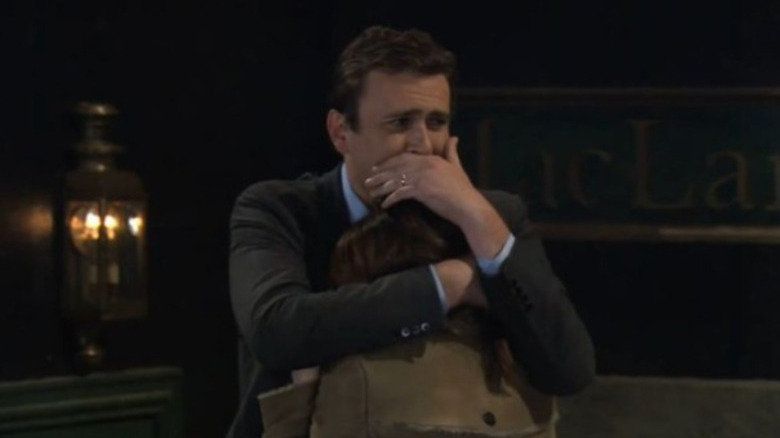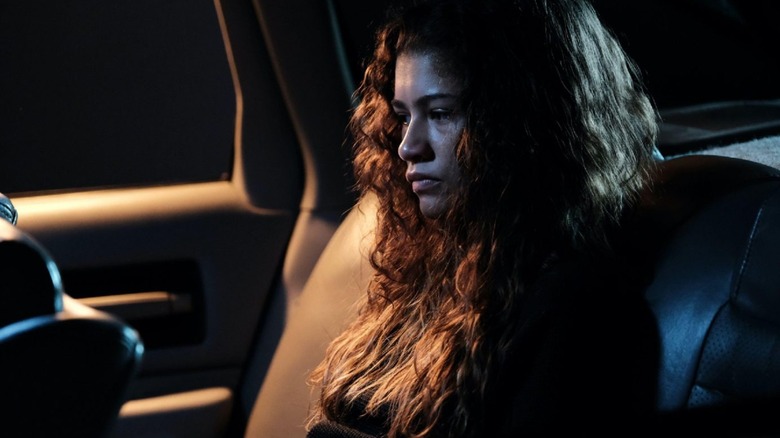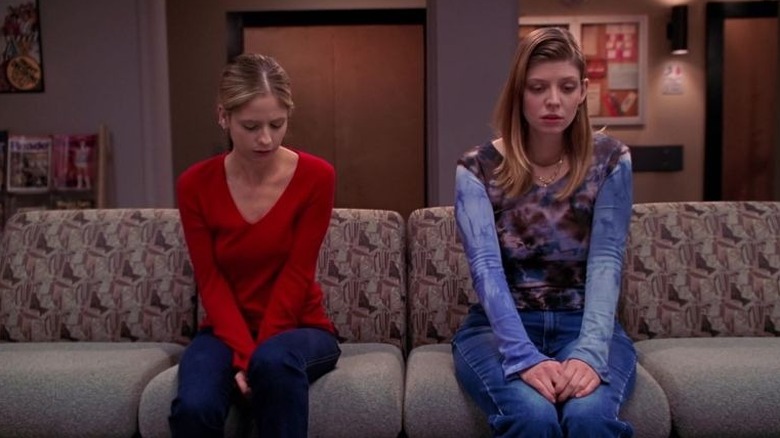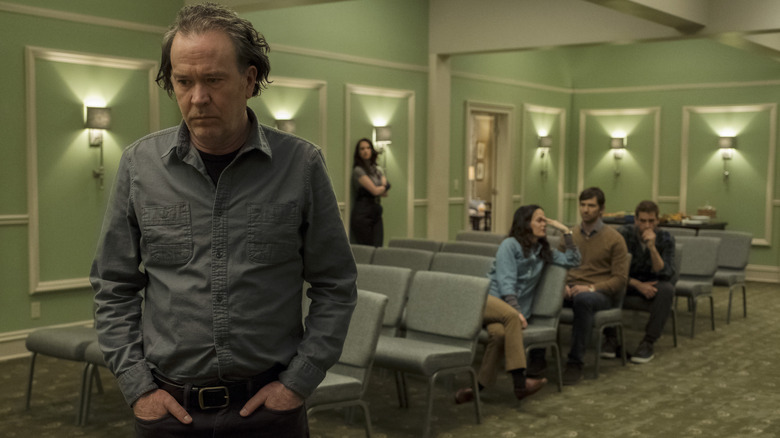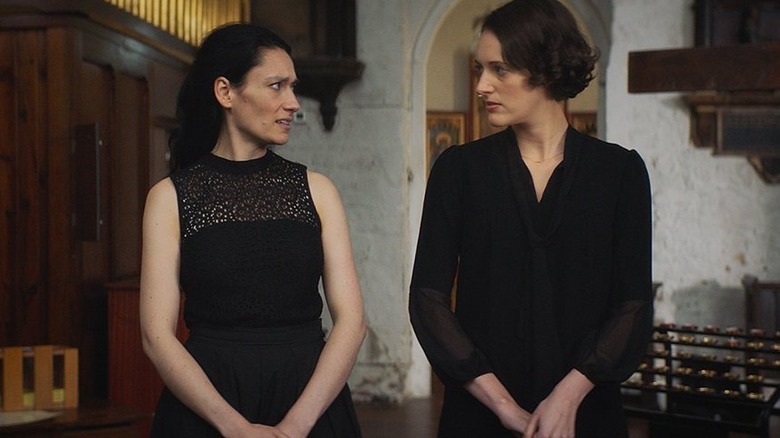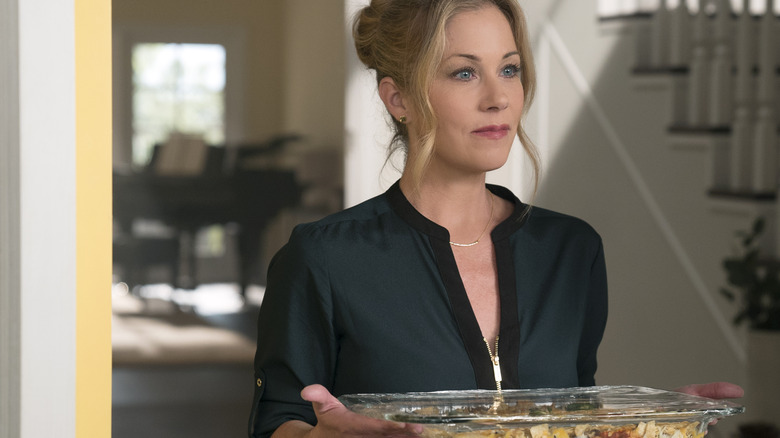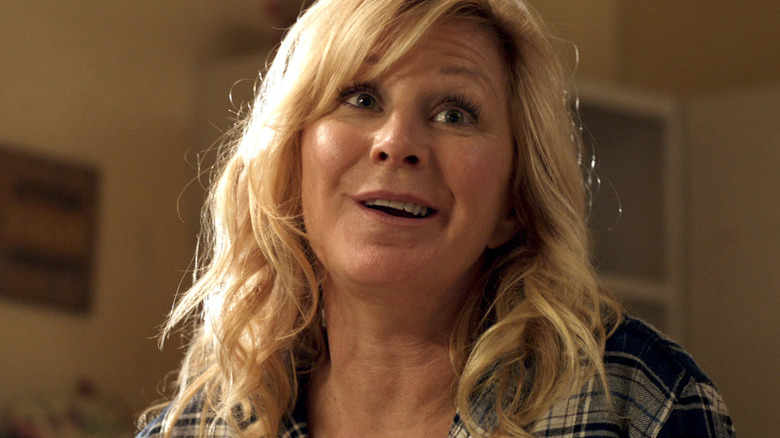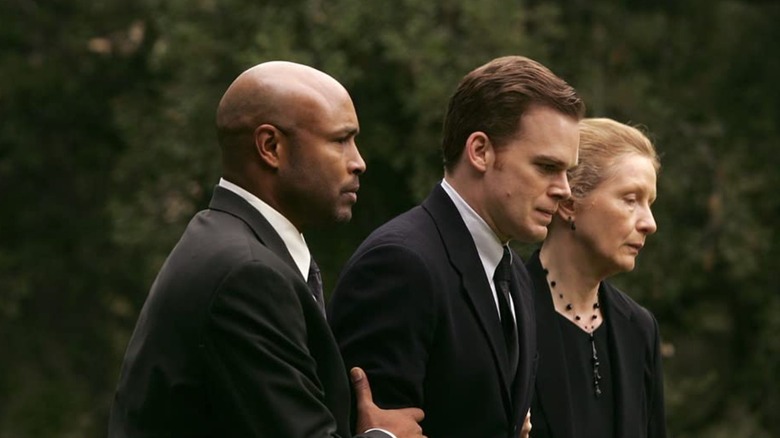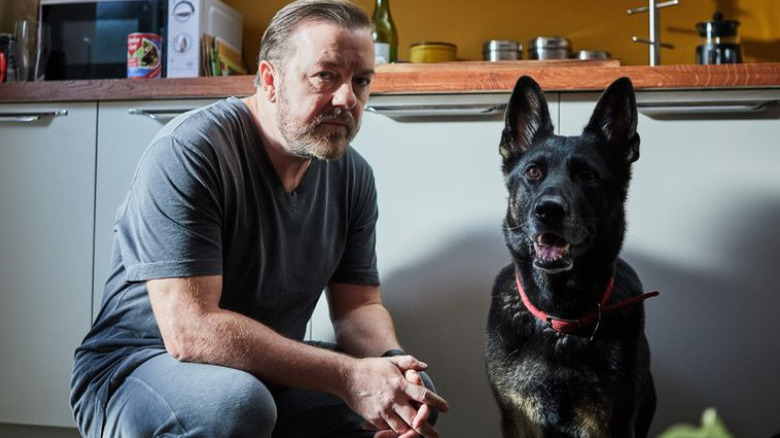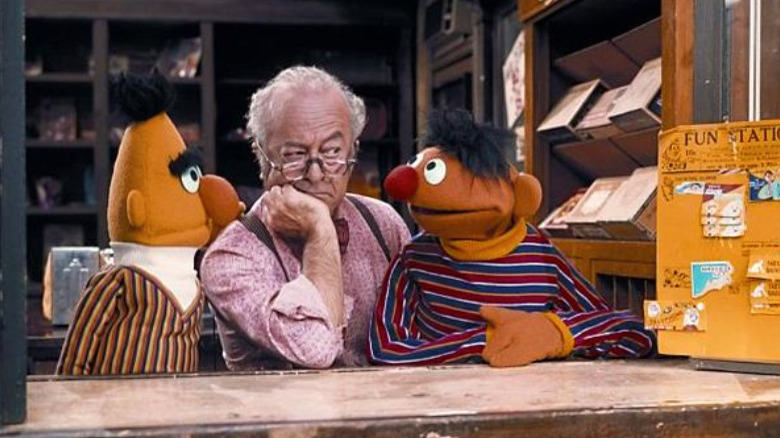TV Show Episodes That Accurately Portray Grief And Loss
We watch television shows for a whole host of reasons. For some, they are merely a source of entertainment, something to pass the time. For others, they're a comfort, a hug of familiarity. But another thing that they can be is support. We can find solace in our favorite characters and feel seen by them, represented, and just that little bit less alone. If you rely on TV shows and films for this sense of comfort — which you just might — you will almost definitely have certain shows that have helped you through difficult times.
Via Insider, psychologist Dr. Faith M. Sproul weighs in on the importance of TV to mental health. According to Dr. Sproul, therapists have been prescribing films or television to "help them gain insight or see how others deal with similar problems in life." Sproul stresses how TV and film can help viewers process emotions, with the added benefit of even encouraging creativity.
Those who do rely on entertainment to help them through know the importance of seeing their own experiences portrayed on screen. This is particularly important when tackling tricky topics like grief and loss. It takes good writing and acting to portray grief accurately, and ultimately the viewer decides whether a show captures the complexities of losing a loved one correctly. Let's dig into some of the best examples. If you're currently grieving a loss, these episodes of television might help to make you feel less alone.
How I Met Your Mother -- Season 6, Episodes 13/14/16
Popular sitcom "How I Met Your Mother" is known for making viewers laugh with relatable storylines for twenty-somethings looking for love. But it also does not shy away from tackling serious issues and recognizes that events like loss are a huge part of life. At the end of Season 6, Episode 13, "Bad News," Marshall Eriksen (Jason Segel) loses his father to a heart attack. What's surprising is that Jason Segel's reaction is totally organic. The actor had expressed a desire to be kept in the dark about the news he receives, so his reaction and state of shock would be real: "My Dad's dead? I'm not ready for this." Show creator Carter Bays (via Entertainment Weekly) commented, "It's our job to watch what happens, but in this case, what Jason and Alyson [Hannigan] were going through was so unbearably real."
In the following episode, "Last Words," Marshall obsesses over what his last words to his father were. But the most poignant scene in this exploration of grief is in Episode 16, "Desperation Day." Marshall has been living at home to look after his mom and tells Ted a heartbreaking story about his dad, that they would drive at night but he would always feel safe. He ends by saying, "Now he's just gone, and it's pitch black. I can't see where I'm going. I can't see anything."
Euphoria -- Season 2, Episode 7
With its dark, provocative portrayals of teens in high school, "Euphoria" explores themes of love, intimacy and angst. It faces emotional problems head-on, and Rue Bennett's (Zendaya) grief is no exception. Our main character and narrator, Rue is a high school student who struggles with addiction to numb the pain she is in after the loss of her father to cancer. Rue is distraught and internalizes her pain, leading to addiction as an escape. We are taken along on her journey from the beginning of Season 1, with her grief explored further in Season 2.
In "The Theater and Its Double," Rue is watching her friend Lexi's play about the lives of their friends. Rue is confronted with the reality of her situation and how she has not been treating herself correctly. A flashback shows Rue speaking at her father's funeral, melded with various memories from her childhood. In the memorial service, Rue gives her eulogy with a shaky voice and tired eyes. She finishes by saying, "You told me that if I ever wanted to be with you, all I would have to do is close my eyes. You said that memories exist outside of time and have no beginning or end. That as long as I live you'll be with me forever. I miss you Dad...I miss you until I close my eyes."
If you or anyone you know needs help with addiction issues, help is available. Visit the Substance Abuse and Mental Health Services Administration website or contact SAMHSA's National Helpline at 1-800-662-HELP (4357).
Buffy the Vampire Slayer -- Season 5, Episode 16
"The Body," Season 5, Episode 16 of the much-loved "Buffy the Vampire Slayer,” covers a tragedy like no other. This show, often set in the realm of demons, vampires and witches, suddenly becomes real and raw. Buffy (Sarah Michelle Gellar) loses her mom, Joyce, to an aneurysm, and her friends gather to support her in an extremely poignant episode that captures the initial grieving experience. Buffy is no stranger to death, but this one hits in an entirely different way. It is strange territory for Buffy, who is used to a whole host of supernatural deaths, but not one caused by just an illness.
Completely devoid of a musical score, with long pauses between lines from the actors, the episode drags out as if in a slow limbo of time. Buffy first tells her sister, Dawn (Michelle Tratchenberg), who is in disbelief. But Buffy's friends all symbolize a different reaction to loss: Xander (Nicholas Brendan) turns to anger, looking for a supernatural explanation. Willow (Alyson Hannigan) becomes stressed and hung up on small insignificant details, like what clothes to wear.
Anya (Emma Caulfield) represents something else entirely. As someone who was once a demon, she does not understand the complexities of grief, and delivers a confused monologue wherein she becomes upset and asks questions. It showcases the confusion that is inherent with losing someone, especially if you have yet to experience it. "The Body" remains a heartbreaking representation of grief, and is regarded by fans as one of the best episodes of "Buffy the Vampire Slayer."
The Haunting of Hill House -- Episode 6
This show falls into a different realm than the ones mentioned above because it's a ghost story. But it is also a deep and accurate representation of grief and how it affects people for the rest of their lives. The complex Episode 6, "Two Storms," is filmed in five long shots, cutting between the funeral home and Hill House, where the haunting took place, and creating a sense of dread. Via a YouTube featurette for "The Haunting of Hill House," director and creator Mike Flanagan discusses the difficulty of shooting an episode consisting of "18-page scenes without any cuts."
The content of the episode (minus all of the supernatural stuff, hopefully) is deeply relatable. The members of a dysfunctional family clash when the adult children are forced back into a room with their father after the death of their sister Nellie (Victoria Pedretti). It captures the quietness of grief. Anger is also prevalent. The siblings project anger towards their father, blaming him for the events that drove Nellie to her death. It is a very raw episode, filled with just as much real-life horror as the supernatural kind. Reddit user lu7421 summed this one up: "While I like the horror aspect and it's done very well, for me this show is all about the family drama."
Fleabag -- Season 2, Episode 4
This Emmy-winning TV show about womanhood, love and family leaves no stones unturned. At its core, "Fleabag" is a story of a grieving woman. The protagonist has lost her mother, and then also loses her best friend, about which she feels a considerable amount of guilt. Season 1 does cover these complex feelings, with Fleabag not knowing how to deal with her grief. But the beginning of Season 2, starting with Fleabag exclaiming that "this is a love story," digs a bit deeper. Episode 4 features a flashback to her mother's funeral, including the awkward greetings of guests and people feigning sympathy.
There is no rule book for dealing with a loss. Fleabag (Phoebe Waller-Bridge) expresses concern about looking too perfect for a funeral and tries to make herself appear less put together. It is hilarious and relatable for anyone who has been in her shoes. What is particularly poignant is Fleabag's conversation with her best friend, Boo, as they stand outside the church. She admits, "I don't know what to do with it. With all the love I have for her. I don't know where to put it now." It circles back to the most important factor of grief — love. Love comes with loss. The Priest mentions this a few episodes later, stating that "love is awful." And it is. "Fleabag" as a show proves that love is awful, but also essential.
Dead To Me -- Season 1, Episode 1
This dark comedy from Netflix, starring Christina Applegate and Linda Cardellini, covers everything about death and dying. "Dead To Me" follows wife and mother Jen (Applegate), who has just lost her husband in a hit-and-run accident. At its core, this show is about grief, but laced through it is the dark comedic partnership of Jen and Judy (Cardellini) that will make you laugh and keep you on the edge. Charlotte Cripps (via The Independent) sums up "Dead To Me" perfectly: "The survivor's guilt and the continual loop of grief, anger, and sadness that the characters go through — I remember all that only too well."
Jen approaches her grieving with a level of anger and disconnection. The pilot shows her receiving sympathy lasagnas from the next door neighbor, who she wants nothing to do with. Her neighbor expresses her condolences and says the classic line: "I can't imagine what you're going through." It's something everyone hears from time to time. Jen, clearly sick of the superficial sympathy, answers truthfully and slams the door in her face. This grimly funny representation of grief will make you laugh and cry in equal measure.
Shameless -- Season 7, Episode 12
Based on a British show about a working class family, the American version of "Shameless" centers around the poor Gallagher family, who live on the South Side of Chicago with a deadbeat father. This concept opens it up for a lot of difficult topics, and "Shameless" has been a beacon of representation for people with mental health and addiction issues. This show manages to cover everything, and death is no exception. The most memorable moment came in Season 7 with the death of the mother, Monica Gallagher (Chloe Webb).
This is a more complex loss, especially for people who have lost someone they were not close with or had a bad history with. In "Shameless," Monica leaves her children to be raised by her eldest daughter, Fiona (Emmy Rossum). She practices bad habits and suffers from extreme mental health issues. When it comes to her passing, her children aren't sure how to feel. In terms of the stages of grief, they remain stuck at anger, because not much will actually change in their day-to-day life. They are accustomed to life without their mom. Bereavement expert Jane Murray (via Marie Curie) writes, "Anger towards a loved one may be more likely if their death was the result of an accident, neglect or self-destructive behavior." The Gallagher children accepted their mom's fate a long time ago, and this portrays their feelings accurately.
Six Feet Under -- Season 5, Episode 10
Another dark comedy, this time from HBO, "Six Feet Under" graced screens with matter-of-fact discussions of death from 2001 to 2005. Like "Dead To Me," a more modern example, "Six Feet Under" is all about dying and grief, and how people handle both. The Fishers lose their father and are thrust into running the family business, the Fisher and Sons funeral home, dealing with the grief of their father and their newfound responsibilities at the same time. The whole show is an impressive representation of sorrow, most memorably in the Season 5 episode "All Alone," which ends with the death of eldest brother Nate Fisher (Peter Krause).
Younger brother David (Michael C. Hall) distracts himself with pointless tasks, taking on the responsibility of dealing with his brother's body. The funeral is an emotional affair, with the characters asking themselves when it will be okay to cry or smile, even though they know there is no correct answer. Mom Ruth (Frances Conroy) reacts with anger and lashes out against David to deal with her pain. Anyone dealing with these complex emotions will relate to this episode. Ariana Bacle (via Entertainment Weekly) got it right: "You can't get over a death, not one that rocks you to your core. You get through it. 'Six Feet Under' didn't just get this; it was made of this."
After Life -- Season 1, Episode 1
Another slightly morbid show that has been making Netflix viewers laugh is "After Life," starring British comedian Ricky Gervais. Gervais stars as a grieving widower, having just lost his wife yet continuing on with his life at a mediocre job. The catch? He is pretty awful. His response to grief is one of complete detachment; he does not care anymore. When he's alone, he rewatches videos of his wife talking to him and reminisces. But the series definitely does something right, as it is now the most watched British comedy on Netflix (via INews).
This type of dark comedy is certainly not for everyone, but there is a consensus that Gervais does manage to portray grief in a new yet truthful way. In a Season 1 review (via The Guardian), Stuart Heritage explains this perfectly: "Crippled by depression and with nothing to live for, [Gervais] spends his days snapping insensitively unvarnished truths at everyone he meets." He almost uses his grief as an excuse to hurl insults at people, and this level of anger at the world is certainly not unheard of. "After Life" is definitely one to try if you are struggling with feelings of anger or a sense of hopelessness. The comedy of Ricky Gervais is questionable, but it might be a hit for those who are grieving.
Sesame Street -- Season 15, Episode 1839
"Sesame Street" is a show most people have watched at one point or another in their lives, with its mix of lovable puppets and friendly humans telling stories, providing education and life lessons, and making us laugh. So when the show was met with a real-life loss, it hit hard. Will Lee, who portrayed shopkeeper Mr Hooper, passed away in 1982. It is a difficult decision for showrunners to decide what to do in a situation such as this, but for "Sesame Street," it was turned into a valuable lesson about grief for younger viewers. Screenwriter Norman Stiles (via Slate) recalled, "It was an opportunity to deal with something that children experience in their lives."
"Sesame Street" did this in an incredible way that was accessible for children, by having the character of Mr. Hooper pass away just as Lee did. Big Bird asked questions about Mr Hooper — why wasn't he coming back? Who was going to take care of the store? — and received truthful answers. It was emotional and hard to watch, but it acted as a perfect conduit for children and parents to discuss a difficult topic and equip youngsters for the inevitable. By using educational resources and tackling these issues in the form of entertainment that kids could understand, "Sesame Street" showed how TV could be a powerful tool in dealing with grief.

